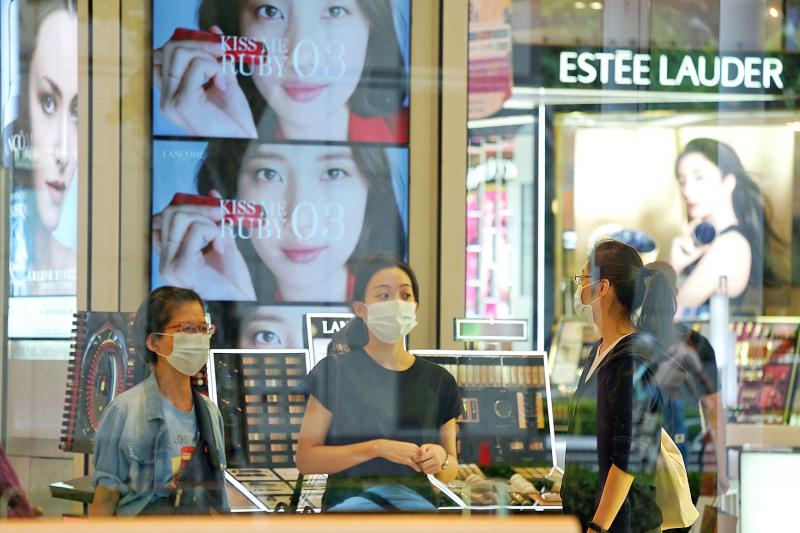The government’s business climate monitor last month flashed “green” for a second consecutive month, as the nation’s economy grew steadily on the back of robust export demand, the National Development Council (NDC) said yesterday.
Major economic barometers, such as industrial production, manufacturing sales and business sentiment increased, raising the total score one point to 27, the council said.
The council uses a five-color system to portray the nation’s economic state, with “green” indicating steady growth, “red” suggesting overheating and “blue” signaling a recession. Dual colors mean it is in transition.

Photo: CNA
Exports might be boosted further with the release of new consumer electronics by global technology titans ahead of the holiday season next month and in December, council research director Wu Ming-huei (吳明蕙) said, referring mainly to Apple Inc’s new iPhones.
Taiwanese companies supply chips, camera lenses, casings, battery packs and other components for the popular mobile phones.
Domestically, wholesale and retail operators, as well as food and beverage providers, all reported a significant upturn in business, bolstered by national holidays and the government’s Triple Stimulus Vouchers, which were used to boost consumer spending, the council said.
The gauges on exports and imports of capital equipment shed amounts attributable chiefly to the appreciation of the New Taiwan dollar and fewer working days, Wu said, adding they should not be taken as signs of losses of momentum.
Exports posted a strong showing in US dollar terms, but the council calculates the nation’s economic data using the NT dollar, she said.
Foreign exchange has become less of a threat to companies with a lead in technology that are prepared for financial volatility, the council said.
The series of leading indicators, used to predict the economic outlook in the coming six months, rose 1.63 percent to 105.77, backed by better export orders, manufacturing sentiment and labor accession rates, as well as new construction floor space, the council said.
Only the reading on real imports of semiconductor equipment registered a negative cyclical movement from a month earlier, it said.
The leading indicators have accumulated a 7.35 percent increase over the past six months, affirming that the recovery is stable, Wu said.
“Invest in Taiwan” programs would continue to lend support, she added.
The council said that the index of coincident indicators, which reflects the current economic situation, rose 1.12 percent to 102.39, gaining for the fourth consecutive month.
Apart from strong retail and wholesale revenues, power consumption and manufacturing sales data were also encouraging, it said.
The council would be on the lookout for downside risks linked to the COVID-19 pandemic and the US presidential election, it added.

South Korea’s equity benchmark yesterday crossed a new milestone just a month after surpassing the once-unthinkable 5,000 mark as surging global memory demand powers the country’s biggest chipmakers. The KOSPI advanced as much as 2.6 percent to a record 6,123, with Samsung Electronics Co and SK Hynix Inc each gaining more than 2 percent. With the benchmark now up 45 percent this year, South Korea’s stock market capitalization has also moved past France’s, following last month’s overtaking of Germany’s. Long overlooked by foreign funds, despite being undervalued, South Korean stocks have now emerged as clear winners in the global market. The so-called “artificial intelligence

NEW IDENTITY: Known for its software, India has expanded into hardware, with its semiconductor industry growing from US$38bn in 2023 to US$45bn to US$50bn India on Saturday inaugurated its first semiconductor assembly and test facility, a milestone in the government’s push to reduce dependence on foreign chipmakers and stake a claim in a sector dominated by China. Indian Prime Minister Narendra Modi opened US firm Micron Technology Inc’s semiconductor assembly, test and packaging unit in his home state of Gujarat, hailing the “dawn of a new era” for India’s technology ambitions. “When young Indians look back in the future, they will see this decade as the turning point in our tech future,” Modi told the event, which was broadcast on his YouTube channel. The plant would convert

‘SEISMIC SHIFT’: The researcher forecast there would be about 1.1 billion mobile shipments this year, down from 1.26 billion the prior year and erasing years of gains The global smartphone market is expected to contract 12.9 percent this year due to the unprecedented memorychip shortage, marking “a crisis like no other,” researcher International Data Corp (IDC) said. The new forecast, a dramatic revision down from earlier estimates, gives the latest accounting of the ongoing memory crunch that is affecting every corner of the electronics industry. The demand for advanced memory to power artificial intelligence (AI) tasks has drained global supply until well into next year and jeopardizes the business model of many smartphone makers. IDC forecast about 1.1 billion mobile shipments this year, down from 1.26 billion the prior

People stand in a Pokemon store in Tokyo on Thursday. One of the world highest-grossing franchises is celebrated its 30th anniversary yesterday.